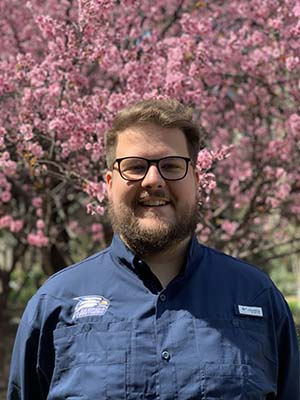Explore the intricacies of Chinese language and culture, building a robust foundation in communication while gaining a deep appreciation for China’s rich history, enduring traditions, and contemporary influences.
Locations
- Statesboro Campus
Why Get your Bachelor of Arts in Chinese at Georgia Southern?
Majoring in Chinese at Georgia Southern offers more than language acquisition—it’s an immersion into one of the world’s oldest and most influential cultures.
Our program transcends basic language skills, exploring the history, art, politics, and cultural practices that shape the Chinese-speaking world. As the U.S. and China are major global economic partners, your Mandarin proficiency will make you a competitive candidate in international business, government, the military, and nonprofits. Moreover, it will equip you with a deeper understanding of the cultural dynamics shaping today’s world.
At Georgia Southern, you’ll thrive in small classes led by experienced faculty and enjoy unique study abroad opportunities. Whether your goal is to work in international business, diplomacy, or cultural exchange, a Chinese degree equips you with the language skills and cultural insights crucial for success across various high-demand fields.
Ready to Apply?
What Can You Do With a Bachelor’s Degree in Chinese?
A bachelor’s degree in Chinese from Georgia Southern University opens the door to opportunities in government, the military, business, international relations, and education.
Your proficiency in Mandarin and understanding of Chinese culture will grow, making you a valuable asset in the global job market. You’ll be well-prepared for roles such as foreign service officer, intelligence analyst, international marketing specialist, or interpreter. The degree also positions you for careers in international nonprofits, journalism, tourism, and technology—fields where cross-cultural communication skills and language expertise are highly prized.
Where our graduates work:
- International Aid
- Education and Research
- Government and Military
- Airline Industry
- Human Resources
- International Business
What our graduates do:
- Translator
- Interpreter
- Intelligence Analyst
- Educator
- Politics
- International Aid
- International Business
What You’ll Learn
Take an engaging journey into Mandarin language mastery and Chinese cultural understanding, immersing yourself in a curriculum that blends intensive language study with courses on Chinese literature, history, culture, politics, art, and philosophy.
Our Chinese language program provides a thorough view of one of the world’s most influential civilizations. As you progress, you’ll hone your language skills through conversation, writing, and translation. Study abroad opportunities offer invaluable firsthand cultural experiences.
Prepare for an enriching career in international business, government, or cultural organizations and cultivate a global perspective essential for thriving in today’s interconnected world.
Study Abroad in China
At Georgia Southern, our Chinese major offers the opportunity to study abroad, as well as a summer immersion program.
Immersion programs like these allow you to experience pure Chinese culture—make dumplings at your faculty’s house, play mahjong and Chinese checkers, learn traditional calligraphy, practice Taichi and so much more.
Learn More
Foundational Chinese Courses
- Elementary Chinese I
For students who have never studied Chinese. Focus on basic communication skills (understanding, speaking, reading, and writing Chinese) and cultural understanding. Includes laboratory program. - Elementary Chinese II
Continued focus on basic communication skills (understanding, speaking, reading, writing Chinese) and cultural understanding, with increased emphasis on active use of the language. Includes laboratory program. - Intermediate Chinese I
This course builds upon communication skills (understanding, speaking, reading, and writing Chinese) and cultural understanding which is developed at the elementary level. - Intermediate Chinese II
Continued building upon proficiency skills (speaking, writing, listening, and reading) and cultural understanding. Focus on development of the ability to create with the language, to resolve simple situations, and to ask and answer questions. After completing this course, successful students should be prepared to function minimally in a Chinese-speaking environment and to take CHIN upper-division courses.
Additional Chinese Courses
- CHIN 3030: Selected Topics in Chinese
- Chinese Culture through Films
- Chinese Idioms
- Chinese Naming Tradition
- Eating Culture in China
- News Reports in China
- Pop Culture in China
- Quotidian Chinese
- Songs and Politics in China
- Tang Dynasty China
- Studies Abroad
- Speaking I and II
- Writing I and II
Minor in Chinese
Earning a minor in Chinese allows you the skill of communicating intra-, inter- and trans-culturally. You’ll be able to adapt to different environments, be more sensitive to diversity and think more
Take Action
Follow these steps to complete the Georgia Southern application:
- Create an application account.
- Complete our online application using the PIN you received after creating your application account.
- Once complete, pay the $30 application fee or upload a valid fee waiver. Previous Georgia Southern applicants and dual enrollment students do not need to pay the fee.
You can check your application status at My.GeorgiaSouthern.edu/admissions three days after completing your application. This page contains live information about your admission status, including a checklist of missing documents we need to make a decision.
Apply to the Master's program Transfer to Georgia SouthernThe following are suggestions to help students and advisors know which level of a FL course the student should register for initially (students should compare their abilities with the descriptions below and plan to sign up for the course that most closely matches their proficiency).
Students should send an email to languages@georgiasouthern.edu to request an appointment for a placement interview and to obtain override authorization into the course.
Note that, because courses are sequenced, it is a huge advantage to students to take a FL class their very first semester or as soon as possible.
Choose…
- FL 1001: If you have no previous language-learning experience all the way to the ability to say and write a few words/phrases.
- FL 1002: If you can say and write simple sentences confidently in the present tense; can ask and answer simple questions; have an awareness of past-tense verbs.
- FL 2001: If you can speak and write in the present tense with relative ease, have an awareness of past-tense narration and can utilize some past-tense verbs accurately; can ask and answer questions related to daily life; can manage a simple conversation, albeit with difficulty.
- FL 2002: If you can speak in the present tense with ease and can successfully attempt some past-tense narration (tell a story in the past); can confidently ask and answer questions related to daily life; can conduct a simple conversation with relative ease.
- FL 3000 level: If you can narrate completely (beginning, middle, end) an experience in the past, although perhaps with grammatical errors and lexical gaps.
Note: You may place out of 1001, 1002, 1060, 2001, 2002, and/or 2060 courses and still get credit for them. If you have taken an offered language previously, you should attempt to take the course that best fits your current abilities—you do not need to and should not start in 1001, if you don’t need to. If you take a higher course and receive a C or better (must be a Georgia Southern course; cannot be an eCore or transfer course from another institution or AP/IB/CLEP credit), you may petition to get credit for the lower course(s) through Credit by Proficiency. For more information about the process click here and/or talk to Department of World Languages and Cultures staff for more information.
- Chinese Club
- Chinese conversation hour
- Chinese video night
- Summer immersion programs
- Chinese Culture Society
- Chinese Taichi hour
- Chinese chess hour
- Shuttlecock hour
- Chinese festival parties
- Chinese Poetry Society
- Chinese calligraphy competitions
- Chinese dumpling party
- Chinese hotpot party
- Pen-pal with college students in China
Student Testimonial

Take the Next Step
Ready to pursue a degree in Chinese language and culture? Learn more about studying Chinese at Georgia Southern University.
Contact Us
Department of World Languages and Cultures
P.O. Box 8081
Statesboro, GA 30460-8081
Phone: 912-478-5281
languages@georgiasouthern.edu
Dr. Zuotang Zhang
Lecturer of Chinese
Interdisciplinary Academic Building #2081
Email: zzhang@georgiasouthern.edu
Phone: 912-478-0244





